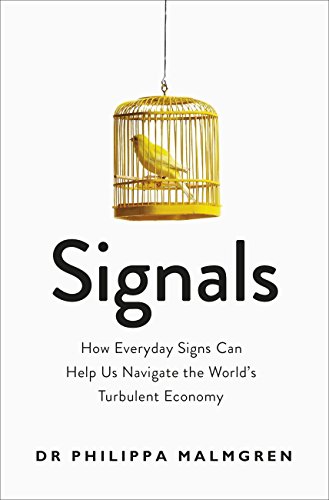In Signals: How Everyday Signs Can Help Us Navigate the World’s Turbulent Economy, Dr Philippa Malmgren draws attention to the everyday signals – from magazine covers to shop fronts – that reveal the state of the world’s economy and help us to understand recent tectonic shifts in global politics. While the book may not propose all the solutions to the problems it identifies, its anecdotal, accessible and democratising approach is welcomed by Ed Jones.
If you are interested in this book review, you may also like to listen to a podcast recording of Dr Philippa Malmgren’s lecture, ‘Signals and Social Consequences From Shrinkflation to Fighter Jets’, recorded at LSE on 19 September 2016.
Signals: How Everyday Signs Can Help US Navigate the World’s Turbulent Economy. Dr Philippa Malmgren. Orion Publishing. 2016.
 The US and other developing countries are raising inflation while keeping interest rates low, thereby increasing asset prices and stimulating their economies. The inflationary push is driving up the costs of primary goods and hard assets in the West; even if you are not paying more, you are still getting less, argues Dr Philippa Malmgren. These effects are magnified when it comes to emerging markets. Dependent on the investment of developed economies, many are finding this inflationary push is driving up the price of primary goods. These matter far more in these countries than they do in the West, since they constitute the bread and butter of millions. The increase in prices in these emerging countries is leading to social unrest, such as the Arab Spring, and to geopolitical confrontation, including incidents in the South China Sea. The impotence of both individual citizens in the West and emerging markets around the world is prompting tectonic changes in world affairs. This is the central argument of Malmgren’s book, Signals: How Everyday Signs Can Help Us Navigate the World’s Turbulent Economy.
The US and other developing countries are raising inflation while keeping interest rates low, thereby increasing asset prices and stimulating their economies. The inflationary push is driving up the costs of primary goods and hard assets in the West; even if you are not paying more, you are still getting less, argues Dr Philippa Malmgren. These effects are magnified when it comes to emerging markets. Dependent on the investment of developed economies, many are finding this inflationary push is driving up the price of primary goods. These matter far more in these countries than they do in the West, since they constitute the bread and butter of millions. The increase in prices in these emerging countries is leading to social unrest, such as the Arab Spring, and to geopolitical confrontation, including incidents in the South China Sea. The impotence of both individual citizens in the West and emerging markets around the world is prompting tectonic changes in world affairs. This is the central argument of Malmgren’s book, Signals: How Everyday Signs Can Help Us Navigate the World’s Turbulent Economy.
You might think this line of reasoning would require an extended theoretical treatise. However, Malmgren’s book is anything but that. A long introductory section intended to ease the general reader into the subject matter uses the overarching framework of ‘signals’: namely, those signs that are accessible to anyone who follows the news and generally watches out for symptoms of economic growth and decline. The democratic appeal of this detective work is clear: anyone can attempt to analyse why Vogue would feature a nude model on its cover instead of one showered in jewels. Even though this does disappear during the heavier parts of the book, if this type of anecdotal, small-data type of writing – which has worked so well for authors such as the marketing expert Martin Lindstrom – encourages people to read Malmgren’s book, it should be welcome. The important thing is that the work of experts be read. The book’s framework should not therefore take away from the salience of much of what Malmgren argues.
Malmgren’s book opens by considering the problems that led to the 2008 economic crisis: namely, hubris and a sheepish overreliance on algorithms. The ensuing chapters lay out the ways in which governments in struggling economies can break the social contract by way of excessive taxation and an absence of representation. In the face of the unpopularity of tax in the West, governments have simply raised inflation with quantitative easing. This has pushed people into higher tax brackets. Governments have also bought their own bonds for years, to the point that the bond market is no longer the warning meter for inflation that it once was. Emerging markets have complained that inflation harms them in more ways than one, since it drives down the value of both their stock and their currency. The Fed, in turn, has suggested they implement measures that would only put more strain on the citizens of emerging markets.
 Image Credit: Sign of the Times (Damian Gadal CC BY 2.0)
Image Credit: Sign of the Times (Damian Gadal CC BY 2.0)
To add insult to injury, the ‘perfect cycle’ of trade has broken: where developed countries previously invested in the expansion of emerging markets that in turn sold cheap products to the industrialised world, increased wages in countries such as China have made them less desirable for those investing in manufacturing, thereby undermining their ability to pay back the debt they acquired to expand their infrastructure in the first place.
For many of these countries, the pursuit of inflation and the fluctuation in interest transcend economics: they constitute a political affront. They create distrust. As such, China’s new Silk Road is an attempt to free the country from those trade routes, which carry essential imports like food and raw materials and are increasingly patrolled by US ships. However, China is not willing to abandon those routes and is taking control of whatever islands might be found on the South China Sea in order to pepper its military presence throughout the area. The US is not backing down either. This led to a Memorandum being signed that declared that military pilots from China and the US would no longer ‘flip the bird’ at each other; picture how close two planes must be for that to happen, argues Malmgren.
Russia, on the other hand, is portrayed in this book as pursuing a realpolitik of calling the US out on its inflationary methods, all the meanwhile pursuing the former Soviet breadbasket that is now Crimea, the oil to be found in the reserves in the Arctic and the Mediterranean and greater influence in the Middle East.
So what kind of measures, then, does Malmgren suggest to address these issues? None, really. The reader is told that innovation in many sectors is the way forward. We are told that the meaning of interest rates should be taught in schools; that we are all signals (presumably in both developed and developing countries); and that we can all change the economy through innovation. We are told that a great solution would be to procreate more, since this would mean more people injecting money into the economy. Based on the sudden jerk between the analysis and the prescription, you would think Malmgren was running for President.
That Malmgren can’t offer solutions to the problems she describes in her concluding remarks should not undermine the value of the rest of her book. The logic that inflation provides a way of tying together economic and political factors in today’s world is certainly worthy of further study. In some areas, this logic falls short. Malmgren, for example, suggests that low tax rates have attracted foreign investment in London property, thereby spurring the economy. As such, Britain would rather leave the EU than lose control of tax rates. But as Malmgren argues throughout the book, spikes in asset prices issue higher prices altogether for those who are worst off. London is the perfect example, now gentrified and unaffordable to the average citizen. In a way, the fact that Dr Malmgren was unable to come up with a solution should perhaps be taken as a ‘signal’ in itself – a sign of the urgent need for everyone, and particularly those in power, to consider these issues.
Ed Jones is a graduate of the LSE and a PhD Candidate in History at the University of Cambridge, with a focus on early modern Spain. Read more by Ed Jones.
Note: This review gives the views of the author, and not the position of the LSE Review of Books blog, or of the London School of Economics.







5 Comments